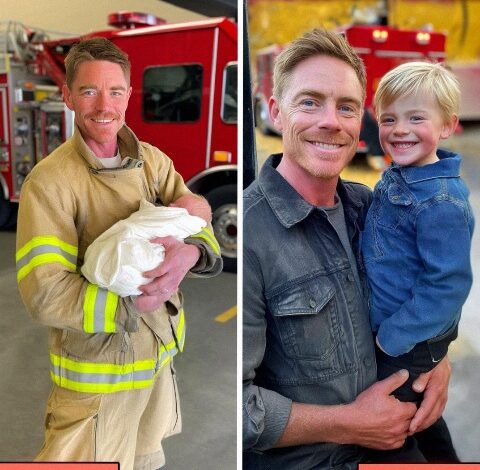I Adopted a Baby Left at the Fire Station – 5 Years Later, a Woman Knocked on My Door & Said, ‘You Have to Give My Child Back’

“The Night the Wind Delivered a Son”
The wind was fierce that night — the kind that hums through cracks and makes the world feel hollow. I was halfway through my shift at Fire Station #14, cradling a chipped mug of coffee that tasted more like survival than caffeine.
Joe, my partner, grinned as he walked in. “Man, you’re gonna burn a hole in your stomach with that sludge.”
I smirked. “It’s not sludge if it keeps you awake.”
He laughed, flipping through an old magazine, when a faint sound sliced through the wind — a cry, thin and trembling, almost swallowed by the storm.
Joe frowned. “Tell me you heard that.”
I was already on my feet. We followed the sound to the front door, and there, tucked in the shadows, was a wicker basket. Joe knelt first, and when he lifted the blanket, a newborn’s face appeared — red, scrunched, and fighting the cold.
“Holy…” Joe whispered. “What now?”
I took the baby in my arms. He was impossibly small, but he gripped my finger with the strength of someone determined to live.
“Call Child Protective Services,” I said, but my voice faltered. Something in me had already shifted — a quiet knowing that this moment wasn’t an accident.
Weeks passed, but the memory didn’t fade. I kept calling CPS “for updates,” pretending it was professional curiosity. Joe saw through it.
“You thinking about adopting him?” he asked one night, half-joking.
“I don’t know,” I said. But my heart already did.
The process was brutal — inspections, interviews, doubts. Every question felt like a test I wasn’t sure I could pass. A single firefighter? Long shifts? What do you know about raising a baby?
But when the call finally came — no one had claimed him — I knew I’d been chosen in a way that had nothing to do with paperwork.
I named him Leo, because even as an infant, he radiated quiet courage. The first time he smiled at me, I realized: I hadn’t rescued him. He’d rescued me.
“Leo,” I whispered, holding him close, “you and me, buddy. We’ve got this.”
The years that followed were beautiful chaos. Mornings filled with cereal catastrophes and debates about dinosaur diets. Evenings spent reading stories where he corrected every “scientific inaccuracy.”
Life became simpler and fuller. Joe would drop by with pizza, teasing me for knowing more about bedtime routines than fire drills. I learned that fatherhood isn’t about knowing what to do — it’s about showing up anyway.
Then one evening, as we built a cardboard Jurassic Park on the living room floor, someone knocked on the door.
A woman stood outside, pale and trembling. “Please,” she said, her voice breaking, “you have to give my child back.”
Time froze.
I stepped out, closing the door behind me. “Who are you?”
“I’m his mother,” she whispered. “I didn’t want to leave him. I was desperate — no home, no money. I thought leaving him at the station would save him.”
“And now you think you can just show up?” My anger cracked through years of quiet gratitude.
Tears filled her eyes. “No. I don’t want to take him away. I just want to see him. To know he’s okay.”
Before I could answer, Leo peeked through the door. “Daddy, who is she?”
I knelt beside him. “Someone who knew you when you were very little.”
The woman — Emily — clasped her hands. “Leo, I’m the woman who brought you into this world.”
He clutched my hand tightly. “Do I have to go with her?”
“No,” I said softly. “No one’s taking you anywhere.”
Emily wept. “I just want a chance to know him. That’s all.”
That night, I barely slept. I kept replaying her words, her eyes — eyes that held the same ache I’d felt holding Leo for the first time.
At first, I didn’t trust her. But she didn’t push. She started showing up quietly — at soccer games, school events, sitting at the far edge of the bleachers with a book. Always watching, never intruding.
One day, Leo tugged my sleeve. “Can she come for pizza with us?”
Emily’s eyes filled with surprise. I sighed, then nodded. “Sure, buddy.”
It wasn’t easy. I kept waiting for her to disappear again. But she stayed — steady, humble, patient.
“I don’t want to take your place,” she said one night as Leo worked on a dinosaur puzzle. “I just want him to know where he came from.”
Over time, she became more than a visitor. She became part of our rhythm — a second heartbeat in our small, strange family.
Years passed. We stumbled, argued, learned. Leo grew into a kind, thoughtful young man. When he graduated high school, I stood beside Emily, our eyes misted with pride.
As Leo walked across the stage, she whispered, “We did good.”
“Yeah,” I said, my throat tight. “We did.”
Reflection
Looking back, I realize the night I found Leo wasn’t fate — it was mercy in disguise. A storm brought him to my door, but it was love that made me open it.
And when Emily returned, trembling on my doorstep years later, it was another mercy — the kind that tests the heart, asking if we can forgive what once broke us.
Family, I’ve learned, isn’t about who leaves or who stays. It’s about who learns to return — and who keeps the door unlocked just long enough to let grace walk in.
Because sometimes, the people God sends to save you arrive wrapped in cries, in guilt, or in second chances.
And sometimes, the greatest act of love isn’t rescue — it’s redemption shared.